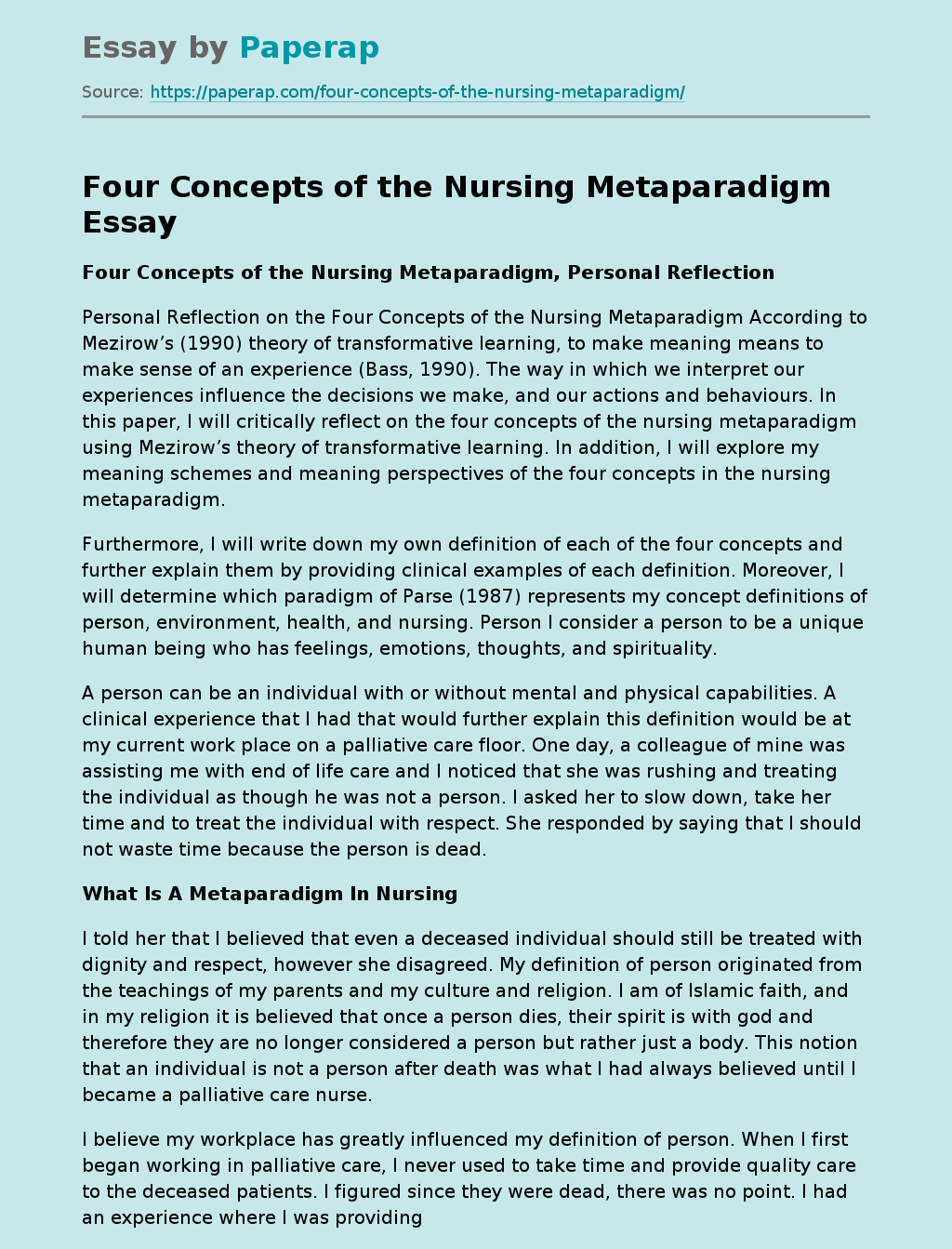Four Concepts of the Nursing Metaparadigm
Four Concepts of the Nursing Metaparadigm, Personal Reflection
Personal Reflection on the Four Concepts of the Nursing Metaparadigm According to Mezirow’s (1990) theory of transformative learning, to make meaning means to make sense of an experience (Bass, 1990). The way in which we interpret our experiences influence the decisions we make, and our actions and behaviours. In this paper, I will critically reflect on the four concepts of the nursing metaparadigm using Mezirow’s theory of transformative learning. In addition, I will explore my meaning schemes and meaning perspectives of the four concepts in the nursing metaparadigm.
Furthermore, I will write down my own definition of each of the four concepts and further explain them by providing clinical examples of each definition. Moreover, I will determine which paradigm of Parse (1987) represents my concept definitions of person, environment, health, and nursing. Person I consider a person to be a unique human being who has feelings, emotions, thoughts, and spirituality.
A person can be an individual with or without mental and physical capabilities.
A clinical experience that I had that would further explain this definition would be at my current work place on a palliative care floor. One day, a colleague of mine was assisting me with end of life care and I noticed that she was rushing and treating the individual as though he was not a person. I asked her to slow down, take her time and to treat the individual with respect. She responded by saying that I should not waste time because the person is dead.
What Is A Metaparadigm In Nursing
I told her that I believed that even a deceased individual should still be treated with dignity and respect, however she disagreed. My definition of person originated from the teachings of my parents and my culture and religion. I am of Islamic faith, and in my religion it is believed that once a person dies, their spirit is with god and therefore they are no longer considered a person but rather just a body. This notion that an individual is not a person after death was what I had always believed until I became a palliative care nurse.
I believe my workplace has greatly influenced my definition of person. When I first began working in palliative care, I never used to take time and provide quality care to the deceased patients. I figured since they were dead, there was no point. I had an experience where I was providing end of life care to a patient, and when I was done the family approached me and explained that they were observing me and that the care I provided was indignifying. They felt as though I had no respect for the dead body of their loved one.
After that situation I reflected and analyzed my actions and behaviours as to why I treated that individual in such a manner. I concluded that my religious traditions and the knowledge that was passed down to me from my parents was the reason why I had behaved in this way. As a result of this incident, and after analyzing my thoughts, I realized that I must treat individuals the same whether they are alive or dead. They are still human beings and they should still be considered a person. My concept definition of person is represented in Parse’s (1987) totality paradigm.
According to Parse’s totality paradigm perspective, a person is considered to be a bio-psycho-social-spiritual organism that can be reduced to its parts (Saunders, 1987). This relates to my concept definition because I defined a person as a human being with feelings, emotions, thoughts, and spirituality. I broke the person down into its parts therefore this proves that my definition is related to the totality paradigm perspective. Health In my opinion, health is being free from illness physically, mentally, emotionally and spiritually. Health is being able to achieve a state homeostasis in the body, mind, and soul.
Health is attained when you are able to reach your optimum level of functioning. A clinical example that would illustrate this definition would be a time when I was doing my clinical at St. Joseph’s Health Care Center on a general medicine floor. I was assigned to care for a patient that had pneumonia, who was previously diagnosed with depression. Since she had both a mental and physical illness, I was treating both health issues rather than just one. Also, she would request that I take her downstairs to the church so that she could pray, which would allow her to express
Four Concepts of the Nursing Metaparadigm. (2019, Dec 05). Retrieved from https://paperap.com/four-concepts-of-the-nursing-metaparadigm/

